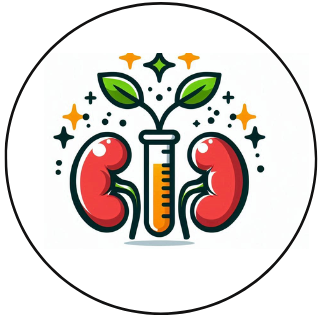Managing Chronic Fatigue with Kidney Disease: Tips to Boost Energy Levels
Chronic kidney disease (CKD) often brings a range of symptoms, with fatigue being one of the most common and challenging to manage. If you’re feeling constantly tired, you’re not alone. Fatigue can make it hard to complete everyday tasks and enjoy life, but there are ways to boost your energy levels and improve your overall quality of life. In this blog post, we’ll discuss practical strategies for managing chronic fatigue associated with kidney disease and offer some helpful affiliate product suggestions to make your journey easier.
Understanding Chronic Fatigue in Kidney Disease
Chronic fatigue occurs when your body is unable to properly eliminate toxins, which is common in people with kidney disease. When your kidneys are not functioning effectively, waste products build up in your blood, contributing to tiredness and lack of energy. Other factors, such as anemia, poor sleep, and poor nutrition, can also play a role in the fatigue experienced by CKD patients.
Tips to Boost Energy Levels
1. Get Enough Sleep
Getting quality sleep is crucial for managing fatigue. Sleep disturbances are common in kidney disease due to symptoms like restless legs, nighttime urination, or sleep apnea.
- Tips: Create a relaxing bedtime routine, limit caffeine intake, and keep a consistent sleep schedule. If you struggle with nighttime urination, limit fluid intake a few hours before bedtime.
Consider using a white noise machine to create a calming sleep environment that helps you fall asleep more easily.
2. Manage Anemia
Anemia is a common cause of fatigue in kidney disease. It occurs when your body doesn’t have enough red blood cells to carry oxygen to your organs.
- Tips: Talk to your healthcare provider about iron supplements or erythropoietin (EPO) injections. Eating iron-rich foods like leafy greens and beans can also help, but make sure they fit into your kidney-friendly diet.
Consider taking a daily iron supplement if recommended by your doctor.
3. Stay Physically Active
While exercise may be the last thing you feel like doing when you’re tired, physical activity can actually help boost your energy levels. Regular, gentle exercise improves circulation, increases endorphins, and combats fatigue.
- Tips: Start with light activities like walking, yoga, or stretching. Aim for 15-20 minutes per day, gradually increasing as you feel comfortable.
Try a resistance band set for simple at-home exercises to help build strength and improve energy levels.
4. Eat a Balanced, Kidney-Friendly Diet
Nutrition plays a significant role in energy levels. Eating the right foods ensures you have the nutrients you need without putting extra strain on your kidneys.
- Tips: Focus on high-quality protein sources, complex carbohydrates, and low-potassium fruits and vegetables. Avoid foods high in sodium and processed sugars, as they can lead to energy crashes.
Use a meal prep container set to prepare kidney-friendly meals ahead of time, making it easier to stay on track.
5. Stay Hydrated (But Not Overhydrated)
Proper hydration is key to maintaining energy, but for people with kidney disease, fluid intake must be balanced. Dehydration can lead to tiredness, while overhydration can increase strain on your kidneys.
- Tips: Talk to your doctor about the right amount of fluid intake for you. Sip fluids throughout the day to stay hydrated without overwhelming your kidneys.
A water bottle with measurements can help you track your fluid intake accurately.
6. Manage Stress and Practice Relaxation Techniques
Stress can drain your energy and worsen fatigue. Relaxation techniques like meditation, deep breathing, or guided imagery can help calm your mind and body.
- Tips: Set aside time each day to practice relaxation exercises. Yoga and mindfulness apps can be beneficial for managing stress and boosting energy.
Consider a meditation cushion set for comfortable, daily relaxation sessions.
7. Take Breaks and Pace Yourself
Learning to pace yourself is essential when dealing with fatigue. Trying to push through tiredness can lead to burnout, making fatigue even worse.
- Tips: Break up larger tasks into smaller, manageable steps, and take breaks when you start feeling tired. Listen to your body and rest when needed.
Use a daily planner to organize your tasks and schedule rest periods to help manage your energy throughout the day. Set timers for work and rest periods to keep yourself on track.
8. Consider Vitamin and Mineral Supplements
Fatigue can sometimes be a result of vitamin or mineral deficiencies, especially in people with dietary restrictions. B vitamins, vitamin D, and iron are often low in those with CKD.
- Tips: Ask your healthcare provider if you should take supplements, especially if blood tests reveal any deficiencies.
Try a B-complex vitamin supplement to help support your energy levels, but only after consulting your doctor.
Conclusion
Chronic fatigue is a common but challenging symptom of kidney disease. By making small lifestyle adjustments—like improving sleep, staying active, eating well, managing stress, and pacing yourself—you can manage fatigue more effectively and enjoy a higher quality of life. Don’t forget to reach out to your healthcare provider if you need personalized advice on managing your energy levels.
If you’re ready to take steps toward boosting your energy, check out some of the suggested products linked above to help support you on your journey to more energy and better health.
Disclaimer: Some of the links above are to other articles regarding kidney health while others are affiliate links. A purchase through one of the affiliate links may allow kidneyfreshfuel.com to receive a small commission without adding any expense to you. It does allow us to continue to bring you quality information.

